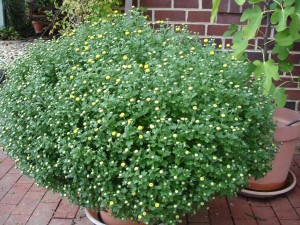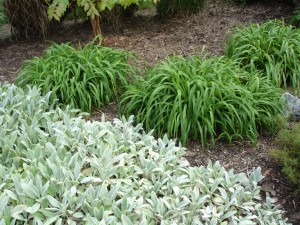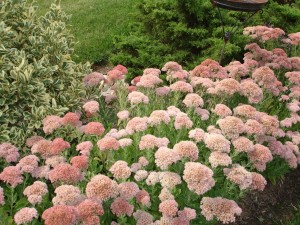
Chrysanthemums have an entire new set of flowers beneath the first set. Deadheading will result in double the flower time!
Perennials, as you know, only bloom for a month or so, and then you are left with an ugly mass of dying flower heads and usually declining foliage on the remainder of the plant. I am often asked about what to do and when to cutback, as opposed to just deadheading, and when to just tear something out. There are many tips I can share with you on all of these questions.
Many plants benefit from cutting back after they bloom. I regularly cut back the foliage on the hosta, yarrow, daylillies, salvia, lamb’s ears and iris to just above the crown of the plant when the flowers are finished. The foliage will re-sprout, and the plants will look fresh throughout the rest of the growing season. This is true with many perennials and herbs.

Here is an example of the second growth on daylillies and lamb's ears. Once the flowering has stopped, cut back to just above the crown and you will be rewarded with a fresh new crop of foliage to last the rest of the season.
Deadheading is a good way to keep your annuals looking at their peak. I would also recommend this for roses all throughout the summer and fall. Even some perennials like mums and dahlias will have a repeat bloom if deadheaded, giving you a repeat performance in the same season. This is also true of pansies. Budget tip: I prefer to plant pansies in the fall, they will come back into bloom in the spring in all their glory, giving you two seasons for the price of one!
I reserve tearing out only for the annuals, and usually between mid-September and mid-October. When the temperature at night starts falling into the 40’s the flowers decline rapidly, so this is when I like to replace them with pansies, ornamental kale or cabbage, or some other Autumn beauty.

Cutting back Sedums and Mums mid-season will yield fuller, more compact plants which will be less prone to splitting open under the weight of full blooms.
When laying out your garden design make sure to consider the texture of the foliage. Try to group differing kinds, because this will give you visual interest when the plants are not in bloom. I also try to stagger the groups in drifts so that as one is blooming it can mask the decline of another variety. For example: If you plant daylillies and daffodils in the same place, the foliage from the daylillies will hide the daffodil leaves as they decline for the season.
This is also a good time to give the mulch a good scratching up to make it look fresh again, and give it one last application of a weed preventer for the year. Fall weeds are really tough, so I do what I can to prevent them from ever starting.
One last tip to take your garden over the top health and beauty-wise is to apply a coating of Horticultural oil (Volck oil) to your foundation plants. This will safely keep the spiders off while giving your plants a really beautiful sheen. This will also protect the leaves from winter burn. I find the easiest way to apply this is with a hose end sprayer, but you can also use a pump sprayer for smaller gardens.
With just a little bit of change your garden can be just as striking in the Autumn as it is in the height of the growing season. Enjoy!

Leave a Reply